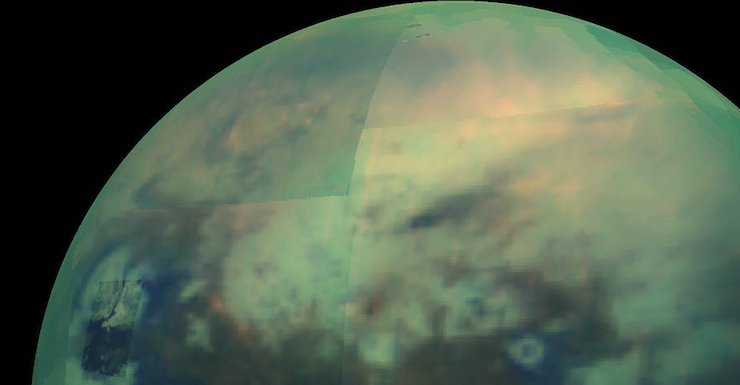It may sometimes seem as if science does nothing but harsh SF’s vibe: “No stealth in space,” “Mars is nigh-impossible to terraform with on-site resources,” “relativity and its speed of light limit has stood up to eleven plus decades of intense testing,” and “all getting bitten by a radioactive spider does is raise a small welt and give one a very slightly increased chance of cancer.” BUT…science gives as well as takes. Here are five examples of ways in which the Solar System as we currently understand it is way more awesome than the Solar System of my youth.
Even limiting oneself to “potential abodes of life (natural or introduced by us)”, the Solar System is far more welcoming than it seemed 40 years ago. Granted, it helps that I grew up in that window between Mariner 2, which ushered in eighteen years of increasingly gloomy revelations about the Solar System, and 1979’s Voyager probes, which revealed a far more interesting Solar System.
The Moon Has Water
Dick Tracy’s Moon Maid and Heinlein’s vanished Lunarians to the contrary, astronomers—as soon as there were astronomers worthy of the name—were pretty certain that the Moon was an airless, dead world subject to extremes of temperature. Space probes confirmed this. The Apollo moon landing then confirmed that the Moon was an arid world far too small to retain an atmosphere for geologically significant periods—a world whose lifeless regolith is made up of tiny jagged shards that can erode space suits and (presumably, with enough exposure) lungs as well.
Although there had been hints as early as 1971 that there might be water on the Moon, probe results in the 1990s and later returned increasingly convincing evidence that despite the lack of air and temperatures that can rise past 100o C, there’s water on the Moon. In fact, there appear to be substantial reserves of water in the permanently shadowed craters at the poles, somewhere between 100 million to one billion tonnes (good news for In-Situ Resource Utilization fans.). As well, researchers Needham and Kring suggest the Moon might have had an atmosphere worthy of the name for as long as seventy million years! Although not recently.
Granted, seventy million years may not be long enough for life to evolve, which gets me to my next item.
Planets Aren’t Quarantined From Each Other
If there’s anything science teaches us, it’s that Mars is a pretty boring place and our seeming endless stream of probes is a waste of resources better spent exploring Titan. Still, the fact that over 130 meteors have been determined to have originated on Mars has interesting implications. Under the right conditions , material can be transferred from one world to another in the Solar System, which raises the interesting possibility that potentially habitable regions unfavourable to abiogenesis might have been seeded from elsewhere. Could have happened is not did happen, of course. Even if it didn’t happen yet, perhaps we could arrange for it to happen in the future.
The Solar System appeared so dismal in the 1960s and 1970s because Earth is a garden world in an otherwise uninteresting part of the Solar System (Venus’ interesting clouds aside). Most moderates agree that nothing says boring quite like the rocky worlds of the inner system, particularly contrasted with the jewel we live on. I assume. I haven’t checked, but that sounds like the sort of thing reasonable people would say. Happily for us, the Solar System is so much more than the inner system.
Ceres Is Not A Dead World
If a dinky world like the Moon seemed arid and unwelcoming, the even dinkier Ceres might seem like an even worse bet for active geology and ample water supplies (and all the very interesting chemistry water permits). Not so! Large enough to have differentiated into layers, Ceres has a core and a water-rich mantle. In fact, there may be more water in Ceres’ mantle than in all of Earth’s fresh water bodies combined. Furthermore, some of that water may be in the form of a subsurface ocean. Which brings me to…
Liquid Water Oceans Turn Out To Be Surprisingly Common
We might have lost Venusian swamps and Martian canals to scientific reality, but reality has more than compensated. The first images from Europa made it clear that water is a significant component in the outer system and that a considerable fraction of it was in liquid form. Icy shells protected the liquid water from evaporation into the vacuum of space. Worlds suspected to have liquid water in familiar form include Ceres, Europa, Ganymede, Callisto, Titan, Triton, Pluto (although Charon’s internal ocean appears to have frozen solid), and astoundingly, the tiny moon Enceladus. We have no idea if these oceans have life (I blame all that money wasted on Mars) but still—what a far cry from the Solar System of forty years ago.
Buy the Book


Static Ruin
Titan Is One Weird-ass Moon
Titan is both like and unlike Earth. It has a dense atmosphere (like Earth’s), one composed largely of nitrogen (like Earth’s), but that atmosphere is just slightly warmer than liquid oxygen. Like Earth, Titan has streams and lakes. Unlike Earth, those streams and lakes do not contain liquid water (because “slightly warmer than liquid oxygen”), but methane and other hydrocarbons. Some of this was suspected as early as 1944 (although I think the nitrogen component had to wait for verification until the Voyager probes) but the full marvel of Titan had to wait until the 21st century and the arrival of the Cassini probe. Even after a lander and repeated Cassini flybys, there are still many questions about Titan to be resolved. Which is why there should be more space probes to the outer system and fewer to Mars.
There’s no evidence of complex life in or on Titan (although we’ve only seen one tiny part of the surface). Still, this is a world where energy-rich chemicals rain down out of the sky, like manna from heaven; if there are replicating chemistries that can function at cold temperatures, Titan seems to offer a suitable place for them to occur. And if nature hasn’t been kind enough to provide them, perhaps we could.
1: Of course, 130+ meteors from Mars is nothing compared to the 16 million, billion tonnes of debris Mercury may have sent our way.
2: The weasel words are because both Uranus and Neptune are thought to have water-rich mantles…which exist under conditions that would make them extremely challenging environments for life as we know it. Still, you could think of Neptune as having an ocean that masses 10 plus Earths and be close to the truth.
In the words of Wikipedia editor TexasAndroid, prolific book reviewer and perennial Darwin Award nominee James Davis Nicoll is of “questionable notability.” His work has appeared in Publishers Weekly and Romantic Times as well as on his own websites, James Nicoll Reviews and Young People Read Old SFF (where he is assisted by editor Karen Lofstrom and web person Adrienne L. Travis). He is surprisingly flammable.










